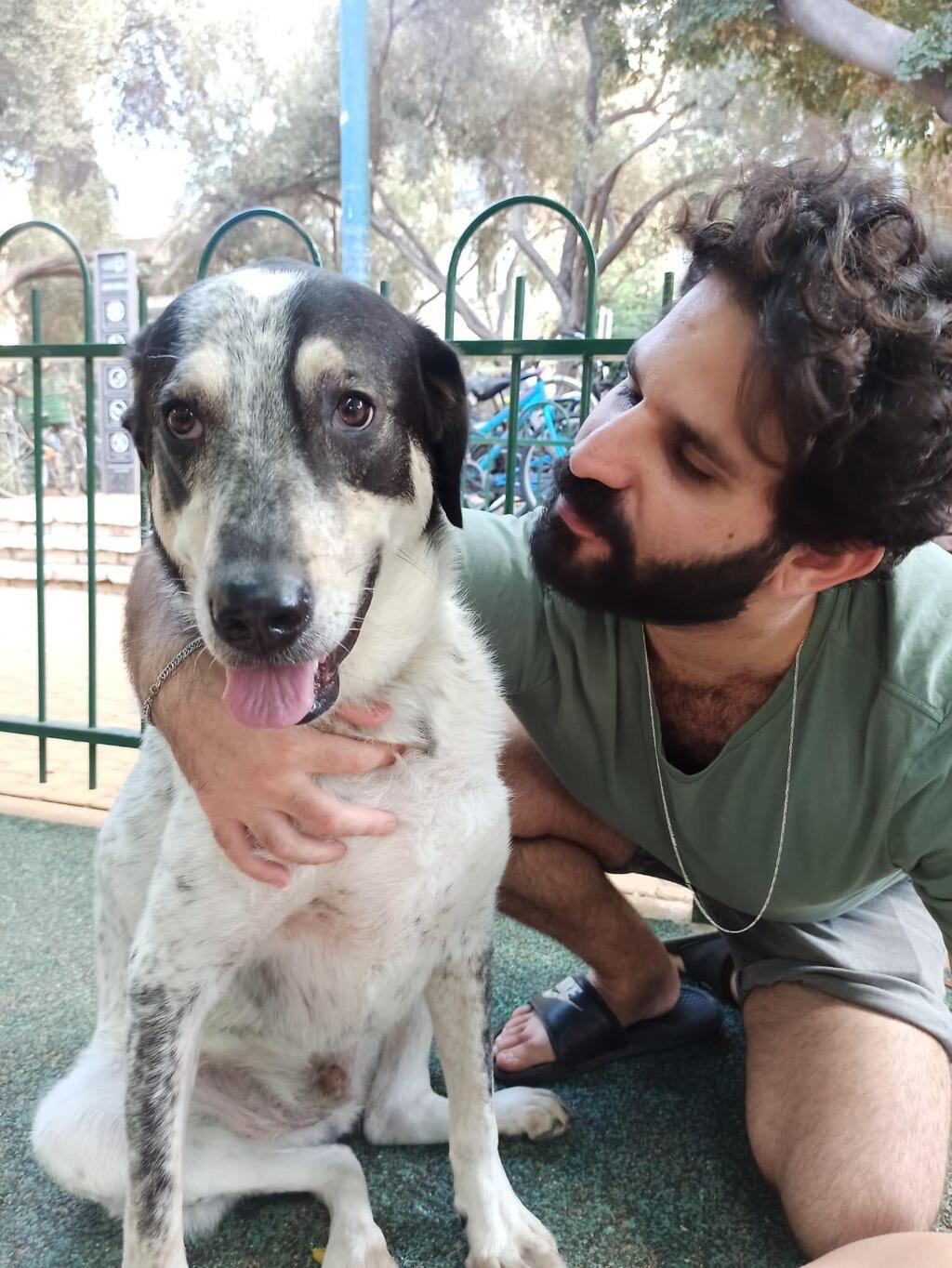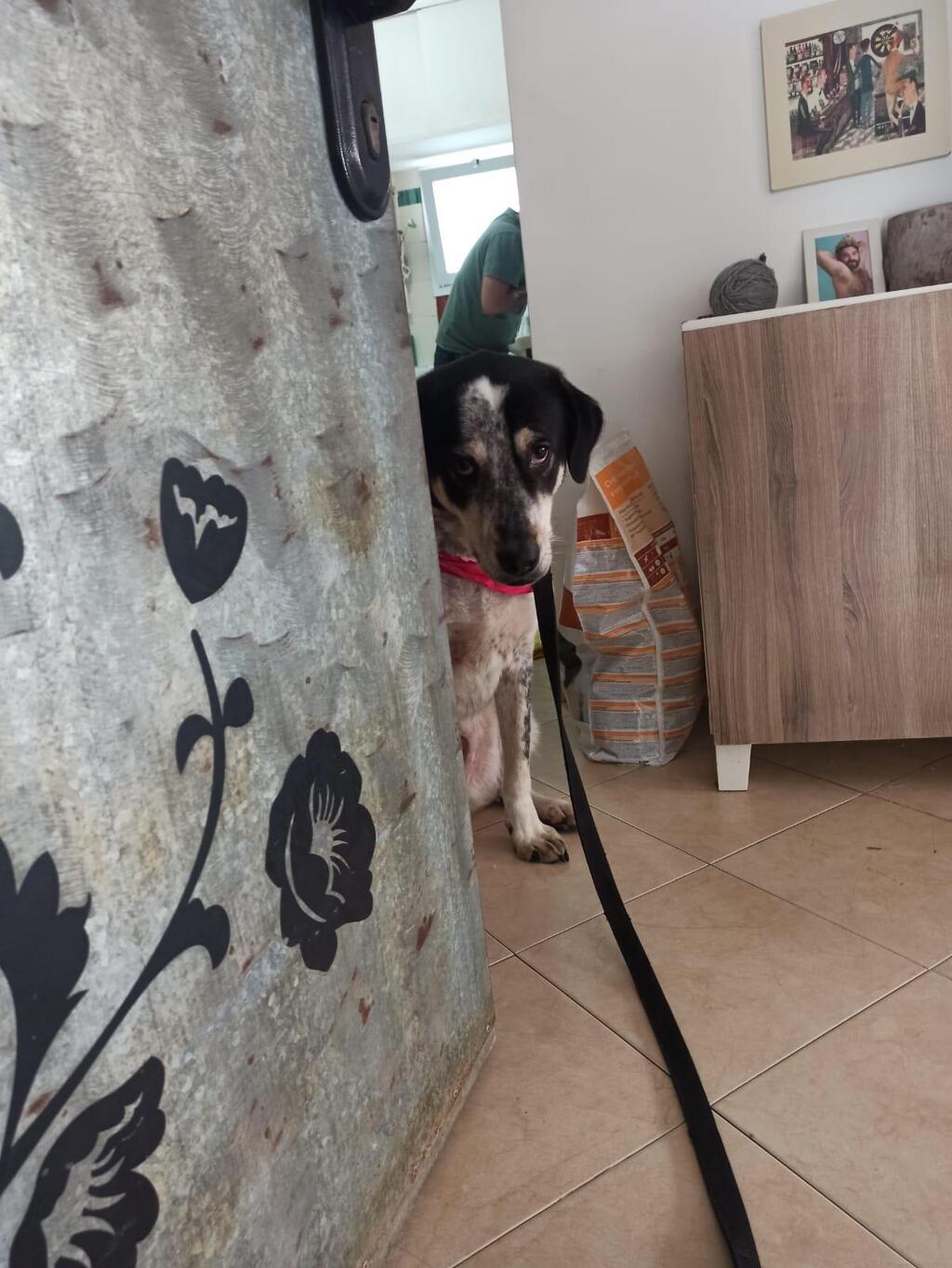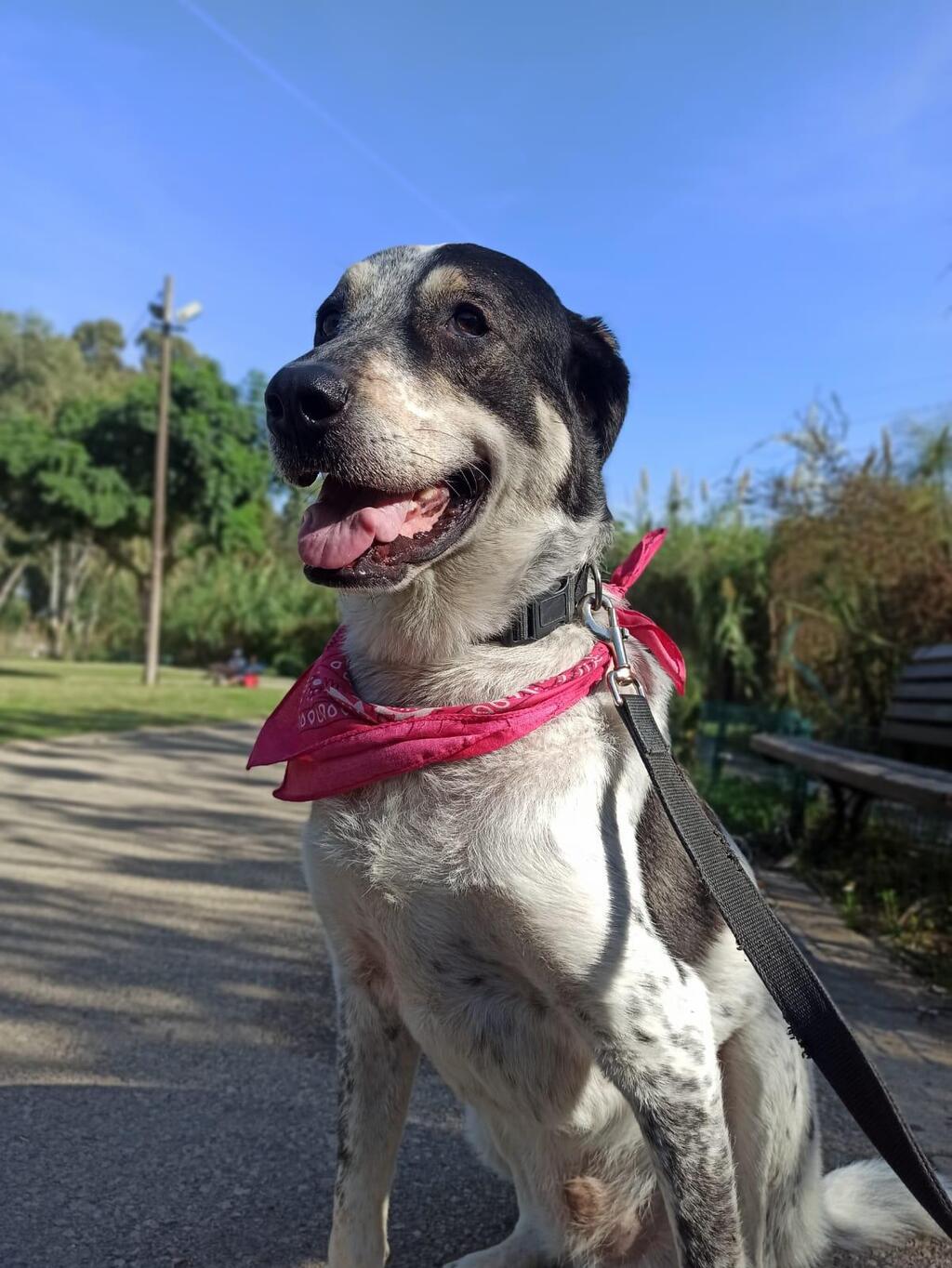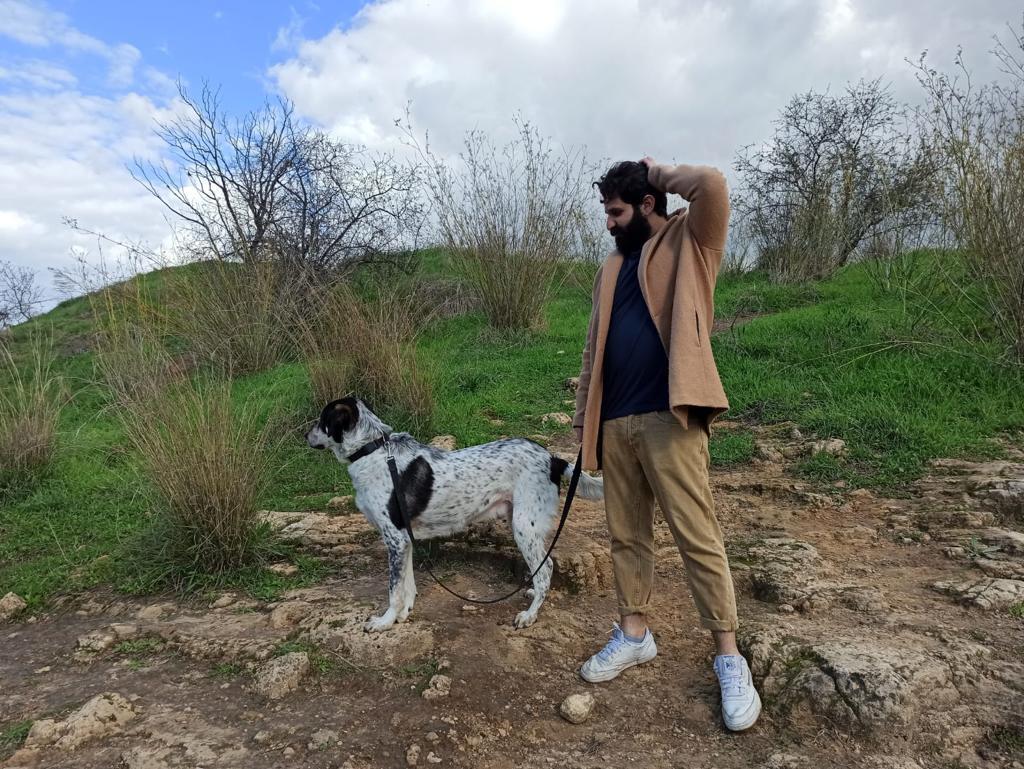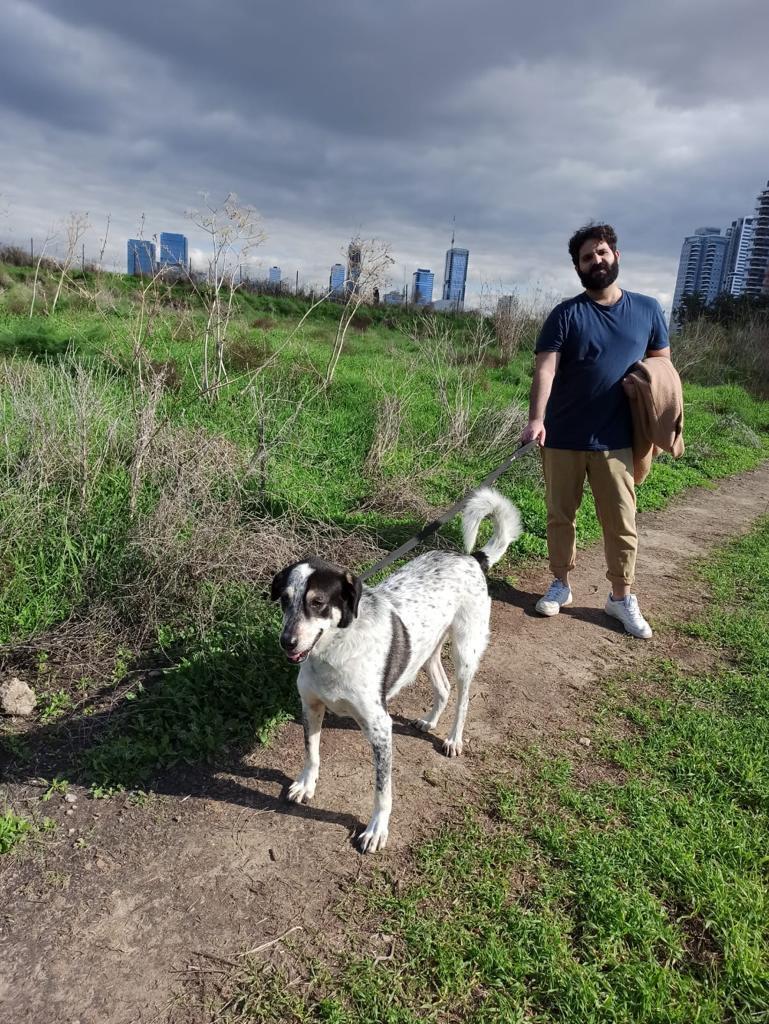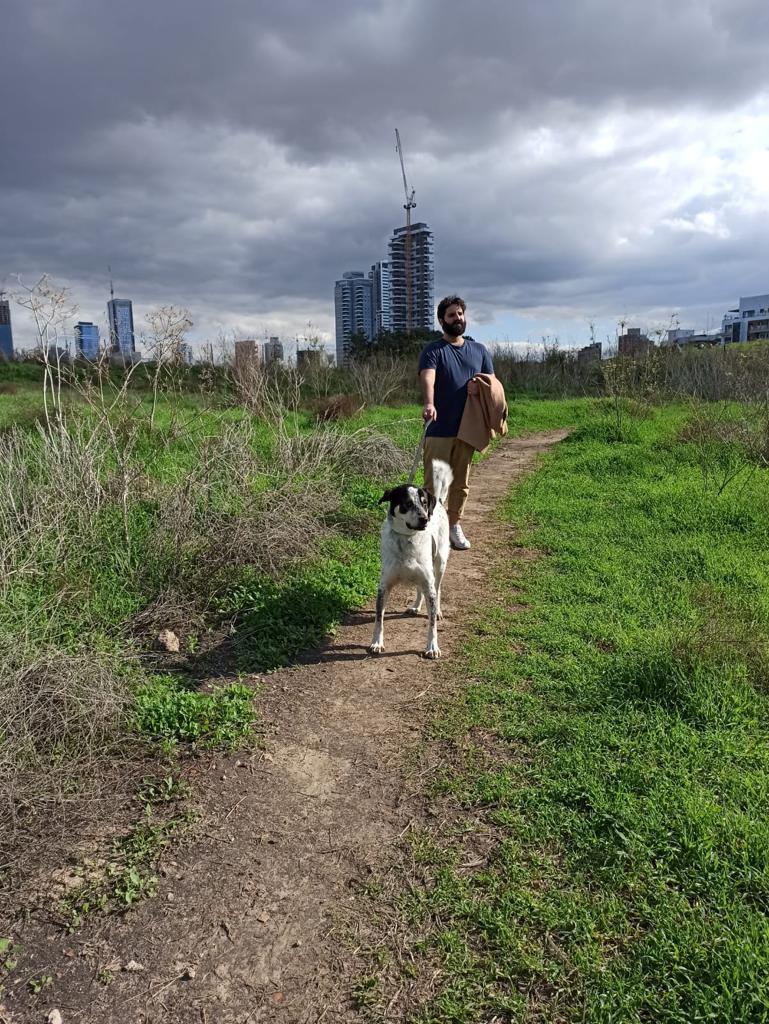Getting your Trinity Audio player ready...
We're walking down the street and his tail is wagging happily. He's in good spirits. Personally, at the beginning of any trip, I silently say my personal prayer - "God in heaven, make this trip a peaceful one". It's a bit messy, a bit steamy, playing with the leash. Let me sit on a bench, staring at my phone, calm and serene, knowing that I can let him wander alone, just like all the other owners sitting and enjoying themselves in the dog park.
Other stories:
On the narrow sidewalk in front of us, a mother and daughter are approaching in big steps. "What a cute dog!" the little girl says to me, seeing my large furry dog, Sebastian. "Can I pet him?"
With a sideways glance, I can already see his black lips puffing up and my heart races. I gently pull him toward me, pet him, and try to calm him down. I already know Sebastian's thoughts on the request. I know I will have to break the little girl's heart.
"Another day, sweetie, but today he's a bit timid," I tell her, contorting my face and making my best "timid" expression. They pass us by as I hold him close, and in my heart, I say thank you. Thank you for it ending the way it did. At least for now, the prayer helped.
He's a "sensitive" dog
Half a year after I adopted Sebastian, my dog, I knew that I was in trouble. He is a true sweetheart. The problem is that only I and the walls of my house know it. For anyone else? It's a serious problem. I tried to brush it aside. I thought it would change. He'll get used to it, I told myself. But he didn't get used to it. At the end of our first six months under the same roof, I had to admit - I lost control.
In the pre-Sebastian era, people could knock on the door, come in, walk around freely, use the bathroom, or make coffee in the kitchen. I would say how pretty I arranged things here and go through my impressive vinyl collection. Those days are gone. And maybe they never existed, maybe I dreamed it all. Now, every time someone enters our home, from my best friend to pizza delivery guys, it’s the same "ceremony”.
I bring Sebastian into the bedroom, put the leash on him, and he already knows - a new person is about to enter our shared space. He wrestles me, resists, not willing to leave me to deal with the danger that's about to invade our home. I overcome him and manage to get him inside. The bedroom door closes on his cute black face.
"I tried to brush it aside. I thought it would change. He'll get used to it, I told myself. But he didn't get used to it. At the end of our first six months under the same roof, I had to admit - I lost control"
When the area is clear, the guest enters. I instruct him to sit on the couch in the living room, mind his own business, and ignore the sound of the nails scratching the next room’s door.
"Don't worry," I try to calm the troubled guest, "he's tied with a leash. I'll take him out in a moment, he'll smell you, relax, and go to his bed." I try to believe the words that come out of my mouth, and mostly I pray.
I open the door, Sebastian storms out, I hold onto his leash - or is he holding onto me? In the living room, my friend is lounging on the couch, fixated on the melodramatic theatrics of his mobile phone screen, "minding his own business." Sebastian identifies the intruder, growls, grunts, and barks in a way that would not shame a lion.
At that very moment, I admit, I have the desire to pull him out of there, to raise my voice, to be a little forceful: "Sebastian, no! What is this supposed to mean?!" To get it into his cute little head that he can't behave like a brute. But instead, I coddle him.
"My sweet Sebastian, we don't behave like this," I hug him tightly while giving him a treat. "Lior is my friend." Sebastian sits down and receives another petting on the house. I kiss and hug him. I can't be angry at him. After all, he's a "sensitive" dog, and I take care of him "with a positive approach."
"I tried to give away my dog three times"
I learned these terms thanks to a Facebook group that I found after admitting to myself that I had lost control. They called themselves the "Support Group for Owners of Sensitive Dogs," and I needed their support.
I read post after post, story after story, and in each one, I could identify my own dog Sebastian. There are other dogs like him. And more importantly, there are other dog owners like me who, instead of obsessing over organic food for their collies alongside the PTA moms of the dog park, rush to separate their dog from the local pack when chaos erupts, as if they were Michelle Pfeiffer in "The Dangerous Minds."
A glimmer of hope snuck into the chaos. Perhaps there is a solution. The dog who terrified guests, delivery men, and innocent people on the street is actually a "sensitive" dog.
Gal Philosof Elya, 37, and Ella Moran, 42, are two behavioral and psychotherapists for four-legged walkers, and they are pillars of the support group, followed by eight thousand members. Philosof founded the Facebook group for sensitive dogs in 2013 - a sleepy group that was then called the tough-sounding "Support Group for Owners of Reactive and Aggressive Dogs." Moran discovered the group, became one of its active members, and eventually joined Gal in leading it.
"Sometimes you can't help but think, Maybe I should give up? Yet, you don't give up because you love him so much, because he's family and you don't give up on family. Because when your dog is 'sensitive,' you yourself, whether you like it or not, become sensitive"
"Until that moment I felt so alone. I even tried to give away Mocha, my dog, three times without success," Moran admits. "I felt like I found a place to unload all the difficulty. Slowly but surely people began to recognize my story."
Philosof, on the other hand, explains how they decided to change the name of the group. "At that time, I was a first-time mother to a baby girl. I spent a lot of time in parent groups, and there was one particular group that I really liked. They talked about how the baby feels and what the baby needs, without ignoring the symptoms.
"When I saw the title of our group, reactive and aggressive, suddenly I said to myself - that's not the thing, after all, aggression is only what is seen on the outside, it's not what happens to them internally. They behave that way because they are sensitive."
Your dog refuses to leave the building
It's hard for me to judge Moran. One must understand that raising a "sensitive" dog is a completely different commitment. You wake up an hour earlier, choose a relatively quiet time, play with him a bit, give him a snack, pet and calm him down before the big event called the "walk." You stand with him in the stairwell for 15 minutes, smiling like a fool to the neighbors in the building, because he has decided that he's not moving and refuses to leave the building.
You know when the time is right to cross the road. You break the hearts of little girls and have to ask people not to pet and say things like "Dogs love me! Do you know how many dogs I've had? Come on, sweetie", and you know you can't prevent the barking that will come any moment.
When you have a sensitive dog at home, you ask your friends to call you when they are downstairs so they don't knock on the door. At two in the morning, when you're already dozing off in front of the TV, he starts jumping around the house, barking and chewing one of your records. You look at David Bowie’s chewed-up face and you know he won't calm down until he goes for a walk. And there it is, he tore his leash again. I'll buy a new one tomorrow.
And sometimes you can't help but think, maybe it's too much for me? Maybe I should give up? Yet, you don't give up because you love him so much, because he's family and you don't give up on family. Because when your dog is "sensitive," you yourself, whether you like it or not, become sensitive.
Therapy for dog has it cost
The second most popular term in the group is "behavioral therapy." Posts like "We adopted our Milo three months ago, he's afraid to leave the house and won't stop barking, any recommendations for a behavioral therapist?" repeated themselves and made me wonder what’s a "behavioral therapist" for dogs.
I knew what’s a dog trainer - someone who teaches giving a paw or jumping through hoops. Reading about more severe cases like Sebastian made me realize it's probably what both of us need.
I didn't truly believe that things would become easier after finding the chosen therapist, one who would help me forget the fact that I rescued a wild stray dog and not a Pomeranian bought for a pretty penny that can be carried in a small pink bag.
I've already come to terms with the fact that my social life, together with my sex life (yes, he insists on sleeping in bed with me, and I can't kick him out because he's "sensitive") and joy for life have all been thrown into the attic, next to my old BMX bike.
And yet, I had to have "the talk" with Smadar, my psychologist, and end the relationship. It turns out that an hour of behavioral therapy for your dog costs quite a bit of money, no less than a therapist for humans. So, I decided to make the necessary sacrifice. I have some issues in life, that's true, but this dog needs care.
"Anxious and aggressive"
Menny Mayer, 39, has been a behavioral and emotional trainer for over a decade. He holds a bachelor's degree in behavioral sciences, and he got into the world of man’s best friend after learning about canine therapy and training dogs to assist the elderly, children on the autistic spectrum, and people struggling with mental health. Now he is here to treat my Sebastian.
"Anxious and aggressive," Menny defines Sebastian, who was found in the hills of Jerusalem when he was only a month old. This dog is only three years old, and in his first two years of life, he mainly went through dog pounds and cages.
Most of his littermates, caught with him, did not survive; Sebastian and his sister, who barely made it out alive when they were closed together in the same crate, were the sole survivors. Undoubtedly a cocktail of traumas that would make anyone prefer the couch at home over the cruel outdoors, the noisy garbage trucks, and that truck that cleans the sidewalks, which scares me too.
"He is a dog that is very sensitive to noises, and the urban living environment is not suitable for him," diagnoses Menny. "Many of these dogs suffer from traumas at very early stages in life, such as separation from their mother a day after they were born or a capture experience, which is usually a difficult experience that creates aggression and lack of trust towards humans.
So it turns out that Sebastian felt at home on a green hill like his ancestors before him - but unfortunately, we are not moving there soon. Instead, we started treatment. Together, with a positive approach
"The second thing that sensitive dogs suffer from is a lack of exposure to the outside world. For most of them, the first memory is between bars inside a crate, in the kennel where they were born."
So it turns out that Sebastian felt at home on a green hill like his ancestors before him - but unfortunately, we are not moving there soon. Instead, we started treatment. Together, with a positive approach. I don't know how I’ll pay rent next month, but this dog has a caregiver "with a positive approach." Marvelous.
Unlike traditional training, where you try to correct problematic behaviors in dogs, in this approach - developed by Karen Pryor in the United States 20 years ago – the therapist tries to understand the motivation for this behavior. Just like in psychological treatment.
"As with any animal, behavior does not occur by chance without being influenced by anything. For example, a person who says 'my dog pulls the leash on walks' does not realize that his dog is just stressed," Menny explains to me while I’m looking for buyers for my right kidney on the black market to finance the treatment.
"In a positive approach, we want to understand what the dog is actually afraid of, to help him to lift his self-confidence, while strengthening the relationship with the owner."
Treat or trick
Menny asks me to meet him, together with Sebastian, during a random walk in the neighborhood. From the street corner, at the agreed rendezvous, Menny observes and examines my and Seb’s joint walk - how I walk with him, what’s my body language, and how Seb reacts to the environment.
We cross two streets, when Sebastian notices the tall, mysterious stranger tailing us. "Take a few steps away from me," Menny requests, rightfully so, after Sebastian realizes that the stranger is not intending to go away. From his black bag, Menny pulls out a bag of treats and starts throwing pieces of meat from it.
"Sebastian, come and get it." Yes, Menny, it's not like I haven't tried the oldest trick in the book, I tell myself. But it turns out it works: after a few attempts, Menny plays his beef-treat pipe and lures Sebastian after him.
In front of us, on the same narrow sidewalk, a couple is approaching. Menny takes out a treat and calls "Seb," and Sebastian happily takes the treat without noticing the two strangers who passed us by.
"We're getting him used to listening to you, so he'll know that when you call him, it's for something good, and that way he'll block out the background noise and only listen to you."
"Good boy, Seb! You're a good dog, Seb!" I shout enthusiastically in the middle of a Ramat Gan street, as if my son has just graduated with honors in social sciences from Tel Aviv University
After every focus competition like this, during which Sebastian does his best to stare at me instead of barking at passersby and other dogs, I need to reinforce him. "Good boy, Seb! You're a good dog, Seb!" I shout enthusiastically in the middle of a Ramat Gan street, as if my son has just graduated with honors in social sciences from Tel Aviv University.
By the third training session, I can cautiously say that Sebastian is starting to get used to Menny, and even starting to love him. Or at least his treats. We have homework assignments and various games that I need to play with him every day. When I take the treat bag out of the drawer, Sebastian hears it, runs to the designated play area, and waits. Now, all we have to do is go outside to the dog park or invite a friend over. Who knows, maybe this time he’ll let him pet him too, God forbid.
We're walking down the street. I'm holding the treat bag as usual. A delivery person crosses our path. "Sebastian, it's okay, I'm with you," I reassure him. His tail stands up. I decide to forgo prayer and trust him - after all, I also have a hard time sometimes. We can all use a little positive approach, and a treat.
First published: 18:56, 04.22.23


